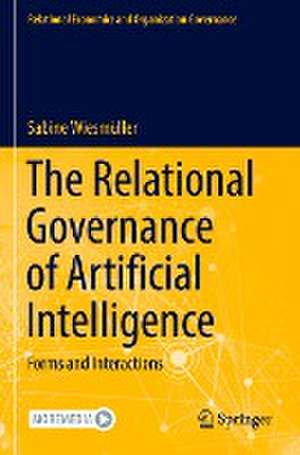The Relational Governance of Artificial Intelligence: Forms and Interactions: Relational Economics and Organization Governance
Autor Sabine Wiesmülleren Limba Engleză Paperback – 4 feb 2024
| Toate formatele și edițiile | Preț | Express |
|---|---|---|
| Paperback (1) | 628.08 lei 38-44 zile | |
| Springer Nature Switzerland – 4 feb 2024 | 628.08 lei 38-44 zile | |
| Hardback (1) | 730.16 lei 6-8 săpt. | |
| Springer Nature Switzerland – 4 feb 2023 | 730.16 lei 6-8 săpt. |
Preț: 628.08 lei
Preț vechi: 826.41 lei
-24% Nou
Puncte Express: 942
Preț estimativ în valută:
120.18€ • 125.80$ • 100.03£
120.18€ • 125.80$ • 100.03£
Carte tipărită la comandă
Livrare economică 27 martie-02 aprilie
Preluare comenzi: 021 569.72.76
Specificații
ISBN-13: 9783031250255
ISBN-10: 3031250257
Pagini: 227
Ilustrații: XV, 227 p. 34 illus., 4 illus. in color.
Dimensiuni: 155 x 235 mm
Ediția:1st ed. 2023
Editura: Springer Nature Switzerland
Colecția Springer
Seria Relational Economics and Organization Governance
Locul publicării:Cham, Switzerland
ISBN-10: 3031250257
Pagini: 227
Ilustrații: XV, 227 p. 34 illus., 4 illus. in color.
Dimensiuni: 155 x 235 mm
Ediția:1st ed. 2023
Editura: Springer Nature Switzerland
Colecția Springer
Seria Relational Economics and Organization Governance
Locul publicării:Cham, Switzerland
Cuprins
Chapter 1. Introduction and Theoretical Foundation.- Chapter 2. A Theoretical Approximation to Artificial Intelligence as an Autopoietic System.- Chapter 3. Conceptualisation of the Relational Governance of Artificial Intelligence.- Chapter 4: Contextualisation of Relational AI Governance in Existing Research.- Chapter 5. Discussion and Conclusion.
Notă biografică
Dr. Sabine Wiesmüller is the managing director of the Bodensee Innovation Cluster and researcher as well as lecturer at Zeppelin University (Germany), particularly focusing on responsible innovation, AI governance, and business ethics. In both, her work at the innovation cluster and her role as a researcher, she is interested in the effects of AI adoption and exponential technologies on the economy and society and new avenues for their suitable governance.
Textul de pe ultima copertă
This book addresses the development and adoption of artificial intelligence (AI) in and by companies and the consequent need for private sector AI regulation. Highlighting the challenges to responsible business conduct and considering stakeholder interests, it identifies ethical concerns and discusses AI standards and AI norms. Based on this needs-based analysis, the author chooses relational economics as a suitable approach to develop a theoretical AI governance model. In doing so, AI is conceptualized within relational economics in the form of an autopoietic system. Building on this theoretical contribution, the book specifies the governance adaptivity of the relational AI governance approach for an unregulated AI market and for the case of the pending E.U. AI regulation, and complements it with inductively conducted categories that summarize the main research streams in AI ethics.
Caracteristici
Presents a comprehensive, theoretical governance model for AI governance Identifies ethical concerns and discusses AI standards and AI norms Analyzes the adoption of artificial intelligence (AI) in companies




